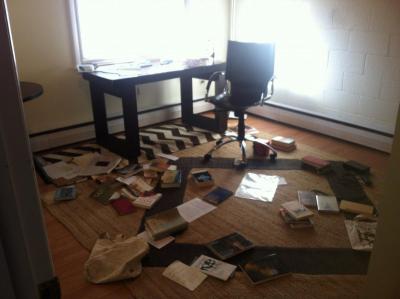My place of fret is not a narrow room, but a room that is short and sort of wide. Poor in natural light, a perpetual bulb’s yellowish wash makes it feel like a cellar, homogeneous, belonging to neither night nor day. This is not a bad thing; the illusion that time is at a standstill helps, but the romance stops there. My desk – solid, coffee black – is directly in front of the only window. Outside of the window is a big green yard with three apple trees at the far end. The daily delight is the family of deer that come at evening to graze. If inside the room time is at a standstill, as I fantasize it to be, the sight of deer outside cast time to a pre-strife world, a Hesiodic world, a world of harmony enacted in the fluid stride of the deer across the yard. The desk, littered with books and notebooks, is my place of second thoughts where I come to arrange and labour through whatever has gestated. A good desk is as important as a good bed.
Books are on the floor. I let them stay there both for their play of titles, which I like to scan when I enter or when I am stuck, and also for their colours and sizes: dull, big; small, bright, and some – Wallace Stevens’s The Palm at the End of the Mind comes to mind – blend directly into the pastel carpet. (Walter Benjamin once said that books not yet on the shelves are “not yet touched by the mild boredom of order.”) This elliptical order is comforting but not intentional; there are no bookshelves here (the library is upstairs). The only thing on the floor consciously ‘placed’ – near mid-centre of the room – is a John Coltrane poster. Still in its plastic cover, it has never been hung in the six years I’ve owned it. Coltrane’s right arm is up and goes behind him to cradle his head; his left hand is at his mouth, index finger on his bottom lip. He looks down, not out, and in that fixed gaze – you can see his pupils clearly – is serious contemplation that the camera flash, so I imagine, cannot disturb. The eyes on the ground abolish any idea of an audience; his contemplation is without vanity; he does not know I am there.

Yet I live with the sense that at a moment’s notice (to use one of the titles of the track on the album, Blue Train, for which the poster is the cover) he will look up and say, OK, got it.
Behind my desk are two double-door closets of a light maroon; the one to the right is closed, and the one to the left is half open. The right is empty, not even a bulb in the socket, but on the shelves of the left are things, odd and conventional, that go back to childhood. On the second shelf is the great treasure: the great three-volume Bulfinch Press edition of The Complete Letters of Vincent Van Gogh. Unlike Coltrane’s fixed, elsewhere gaze, the Letters gaze out from their aperture with godlike scrutiny on my secular (and slow) work.
In this space I come for brief solace, it is hard not to be aware of Van Gogh’s tone: urgent, often restless. As I write now I look up through the window and see a deer, a young buck with horns just starting. Mere months ago, in summer – we are now at the end of autumn – there were no horns and there was a faint, reddish blaze to its body. Now the pelt is almost fully ash, and the pronounced muscles have transformed its body from a lean, smooth flow to a powerful movement of what Auden calls “mass and majesty.” There the romance begins.
Ishion Hutchinson was born in Port Antonio, Jamaica. His first collection, Far District, won the PEN/Joyce Osterweil Award. He is an assistant professor of English at Cornell University.



